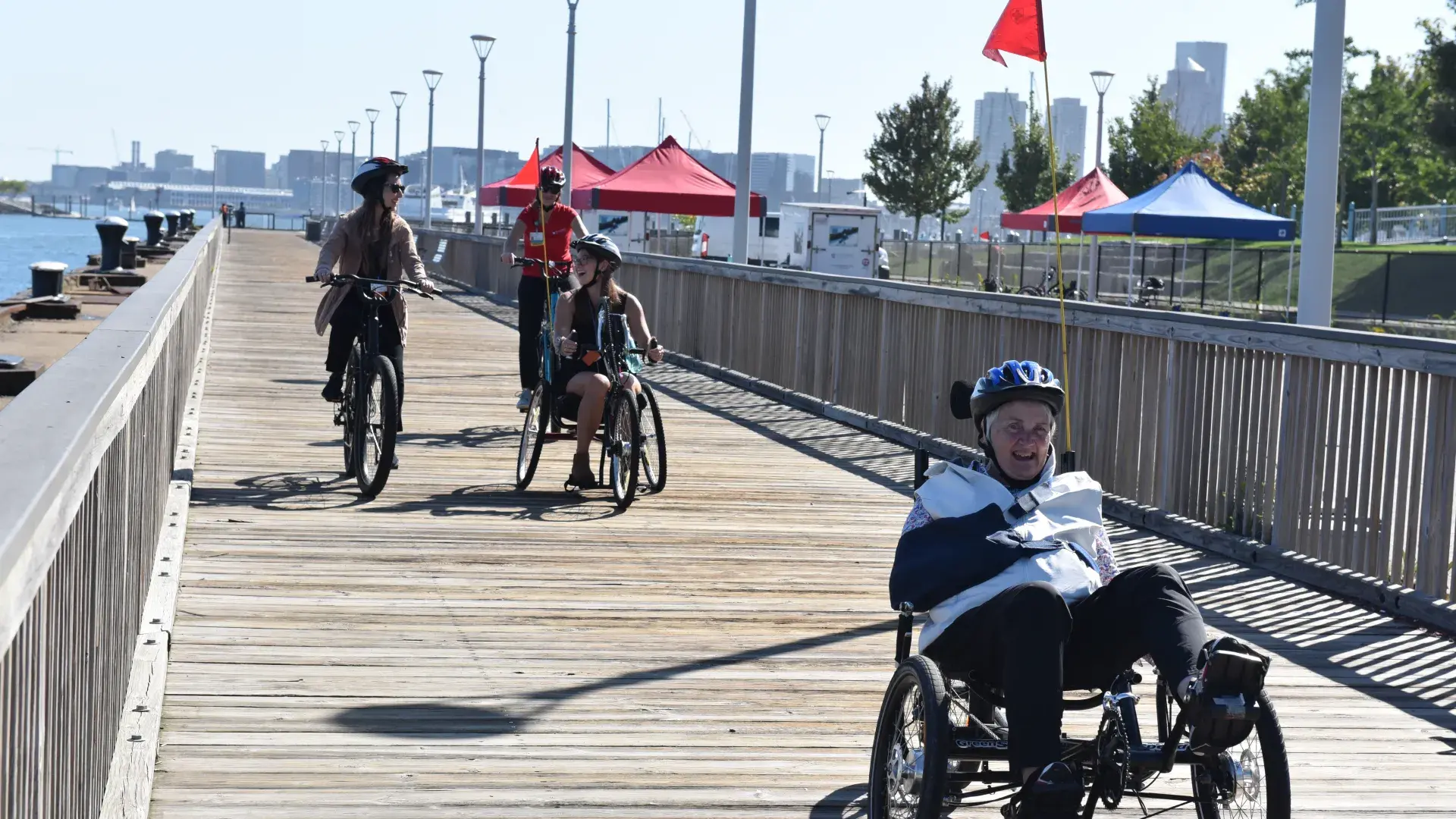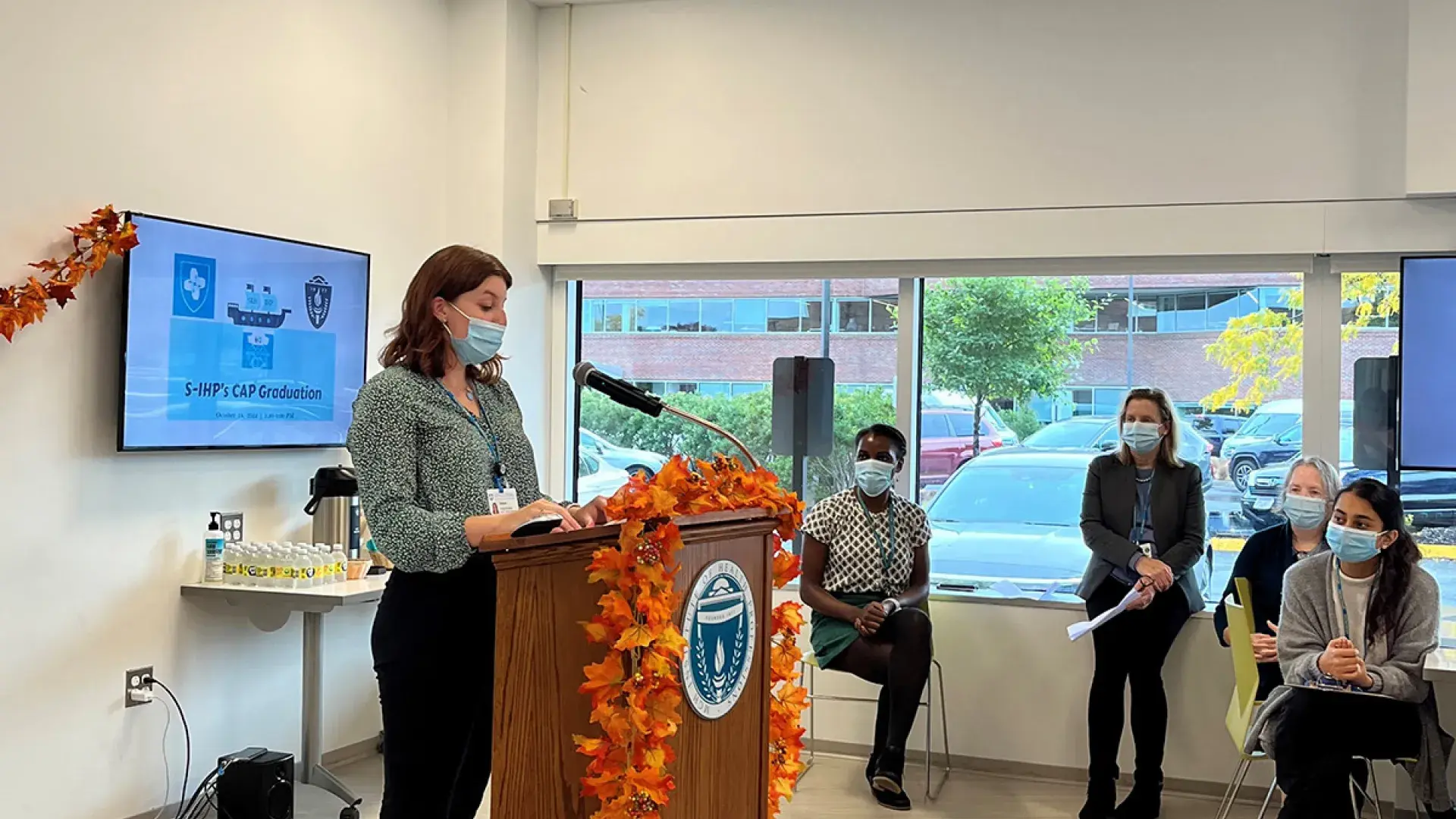
Clients in Spaulding-IHP’s Comprehensive Aphasia program cohort wrapped up six weeks spent working with SLP and OT students and faculty in speech therapy, wellness, and social activities.
Each fall since 2015, several stroke survivors arrive at the Sanders IMPACT Practice Center on the campus of MGH Institute of Health Professions, unsure of what they’re about to embark on but excited about the opportunities for recovery that lay ahead.
“I had no idea what to expect,” shared Mary, a member of this year’s program cohort. “I was a little nervous, but excited.”
The Spaulding-IHP’s Comprehensive Aphasia (S-IHP's CAP) program is a six-week intensive treatment program for adults with aphasia. Aphasia is a language disorder that often occurs after stroke, impacting both written and verbal communication, including comprehension. The program, a collaboration with nearby Spaulding Rehabilitation Hospital, is designed to maximize patients’ recovery so they can return to activities; it operates on a more holistic recovery model than similar aphasia programs.
“What’s different about this program is the interprofessional nature of everything that we do,” said Esther Ayuk, an Instructor in the Department of Communication Sciences and Disorders and Clinical Supervisor at the school’s Aphasia Center who leads the S-IHP’s CAP program at the Institute. “From collaborating at the time of creating the program to the assessments that we use; we constantly make sure that we're not just focusing on the language impairment but instead are prioritizing the whole person. We consider other factors critical to meeting their goals including their participation in life situations, their personal identity and feelings, and the communication environment. We aim to support their success using this life participation approach to aphasia (LPAA).”
Participants engage in individual, small and large-group speech-language therapy, group occupational therapy and physical therapy, and wellness activities including mindfulness, adaptive sports, and swim group, social lunches, music therapy. The program is led by speech-language pathology and occupational therapy students under faculty supervision, an interprofessional partnership that is beneficial to both students and clients.
Grace Burleson, a speech language pathology student involved in the S-IHP’s CAP program, spoke at the graduation, sharing the impact the program has had on her and her peers.
“As SLPs, we focus on enhancing communication and cognitive skills, including reading and writing, speaking, and listening, attention, memory and problem-solving skills. Over the past six weeks, we've planned and executed individual sessions, small group sessions and large group SLP sessions,” she shared. “I can speak for all of us today that it has been such a pleasure getting to spend time with all the participants over the past six weeks. We are truly grateful to have been a part of your rehabilitation journey.”
Rachel Pittmann, Director of the IMPACT Practice Center, believes it’s the duality of the interprofessionalism the program embodies that makes its outcomes so impressive.
“Interprofessional practice is an essential ingredient to the services provided within intensive comprehensive aphasia programs in general, as it enables multiple health care practitioners and students to learn about and from each other in the unique and overlapping roles each health care provider has and optimize the care provided to people with aphasia,” said Pittmann. “The way we do it at the IPC stands out, as it really is the lifeblood of our services.”
Dr. Mary Hildebrand, Director of the Occupational Therapy Center for Learning, Participation, and Rehabilitation (OT CLiPR) and Assistant Professor, echoed this sentiment, discussing just how impactful the S-IHP’s CAP program has been for students’ education.
“Occupational therapy has been a critical part of the S-IHPS-CAP program for seven years—since the beginning,” she said. “The OT doctoral students who have been a part of it have always described it as one of the most valuable opportunities they have had here at the IHP. They learn so much from the participants and other professions and it brings to life what they have learned in their courses.”
As a result of the dedicated clinicians, students, and faculty, the carefully planned and executed programming, and the interprofessional nature of the S-IHP’s CAP program, clients are offered the opportunity to receive the care they deserve – and the kind of care that will ultimately impact their quality of life.
For Mary, as a client receiving services as part of the S-IHP’s CAP program the music classes were her favorite, and the one-on-one time with speech language pathologists was exactly what she needed. After graduating from the program, she feels empowered to partake in one of her favorite pastimes yet again.
“I’m excited to golf,” she said succinctly. And golf, she will.
Do you have a story the Office of Strategic Communications should know about? If so, email ihposc [at] mghihp.edu (ihposc[at]mghihp[dot]edu).

